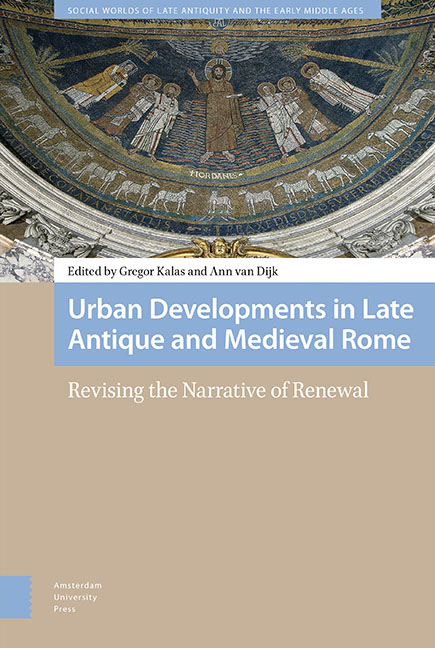Book contents
- Frontmatter
- Contents
- Preface and Acknowledgments
- List of Abbreviations
- 1 Introduction: Revising the Narrative of Renewal for Late Antique and Medieval Rome
- 2 Rome at War: The Effects of Crisis on Church and Community in Late Antiquity
- 3 Portraits of Poets and the Lecture Halls in the Forum of Trajan : Masking Cultural Tensions in Late Antique Rome
- 4 Rolling Out the Red Carpet, Roman-Style : The Arrival at Rome From Constantine to Charlemagne
- 5 (Re-)Founding Christian Rome: The Honorian Project of the Early Seventh Century
- 6 After Antiquity: Renewing the Past or Celebrating the Present? Early Medieval Apse Mosaics in Rome
- 7 The Re-Invention of Rome in the Early Middle Ages
- 8 Rewriting the Renouveau
- 9 Renewal, Heritage, and Exchange in Eleventh-Century Roman Chant Traditions
- 10 Reforming Readers, Reforming Texts: The Making of Discursive Community in Gregorian Rome
- Manuscripts Cited
- Index
10 - Reforming Readers, Reforming Texts: The Making of Discursive Community in Gregorian Rome
Published online by Cambridge University Press: 18 June 2021
- Frontmatter
- Contents
- Preface and Acknowledgments
- List of Abbreviations
- 1 Introduction: Revising the Narrative of Renewal for Late Antique and Medieval Rome
- 2 Rome at War: The Effects of Crisis on Church and Community in Late Antiquity
- 3 Portraits of Poets and the Lecture Halls in the Forum of Trajan : Masking Cultural Tensions in Late Antique Rome
- 4 Rolling Out the Red Carpet, Roman-Style : The Arrival at Rome From Constantine to Charlemagne
- 5 (Re-)Founding Christian Rome: The Honorian Project of the Early Seventh Century
- 6 After Antiquity: Renewing the Past or Celebrating the Present? Early Medieval Apse Mosaics in Rome
- 7 The Re-Invention of Rome in the Early Middle Ages
- 8 Rewriting the Renouveau
- 9 Renewal, Heritage, and Exchange in Eleventh-Century Roman Chant Traditions
- 10 Reforming Readers, Reforming Texts: The Making of Discursive Community in Gregorian Rome
- Manuscripts Cited
- Index
Summary
Abstract
The late eleventh century witnessed the growing assertion of the Roman pope's role as judge over ecclesiastical affairs. Yet, the institutional imagination behind these developments was more complex and fragile and less developed than is often assumed. Using three specific witnesses – Peter Damian; Atto, cardinal priest of San Marco; and Bruno, cardinal bishop of Segni – this essay reveals the focused, but idiosyncratic, attention that members of the Roman clergy paid to ‘the ecclesial imaginary’. These witnesses reveal that the Roman clergy's own consciousness of its place and power was hard won mental terrain that had continually to be reinforced and defended. They also reveal sustained effort to anchor this transformed institutional consciousness firmly in the authority of texts.
Keywords: exegesis, canon law, clerical cognition, Peter Damian, Bruno of Segni, Atto of San Marco
In his now classic study of the social dimensions of medieval reading techniques, The Implications of Literacy. Written Language and Models of Interpretation in the Eleventh and Twelfth Centuries, Brian Stock introduced the term ‘textual communities’ to describe groups who came to be united by a set of shared texts and, more importantly, a shared allegiance to specific individuals who guided their understanding of these texts and their implications for personal and institutional life. He noted that:
An important consequence of literacy in any society arises from the area of social organization. Relationships between the individual and the family, the group, and the wider community are all influenced by the degree to which society acknowledges written principles of operation. Literacy affects the ways in which people conceptualize these patterns of operations, and these patterns of thought inevitably feed back into the network of real dependencies.
For Stock, ‘literacy’ thus represented not so much the mere ability to read or otherwise access the content of texts, but rather the more comprehensive and demanding instinct or habit to process the world and human behavior through the refractive and defractive power of texts. In his study, Stock concentrated on the way in which this concept of literacy could assist in understanding the emergence of lay heretical and reformist groups in France and Italy during the eleventh century.
- Type
- Chapter
- Information
- Urban Developments in Late Antique and Medieval RomeRevising the Narrative of Renewal, pp. 299 - 330Publisher: Amsterdam University PressPrint publication year: 2021



